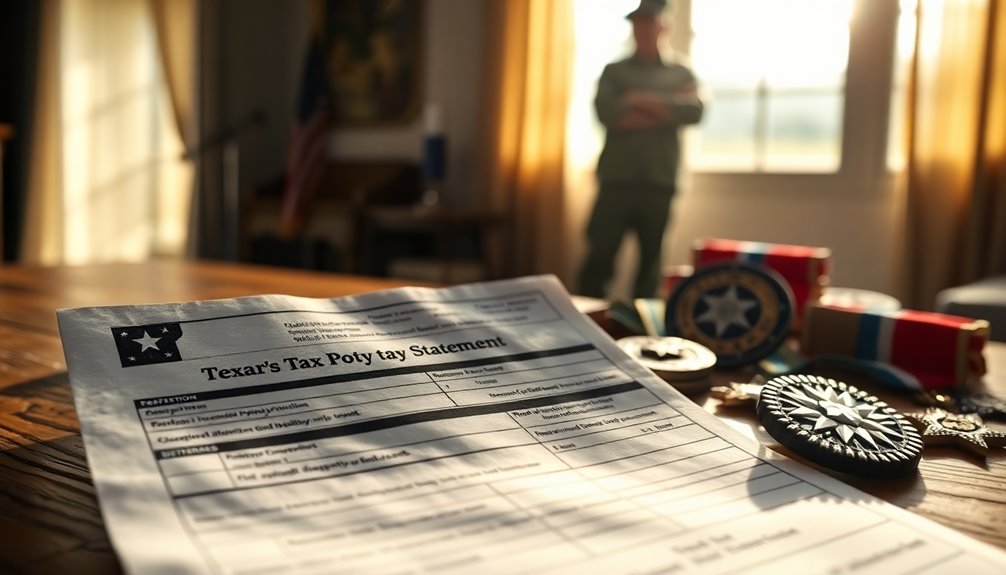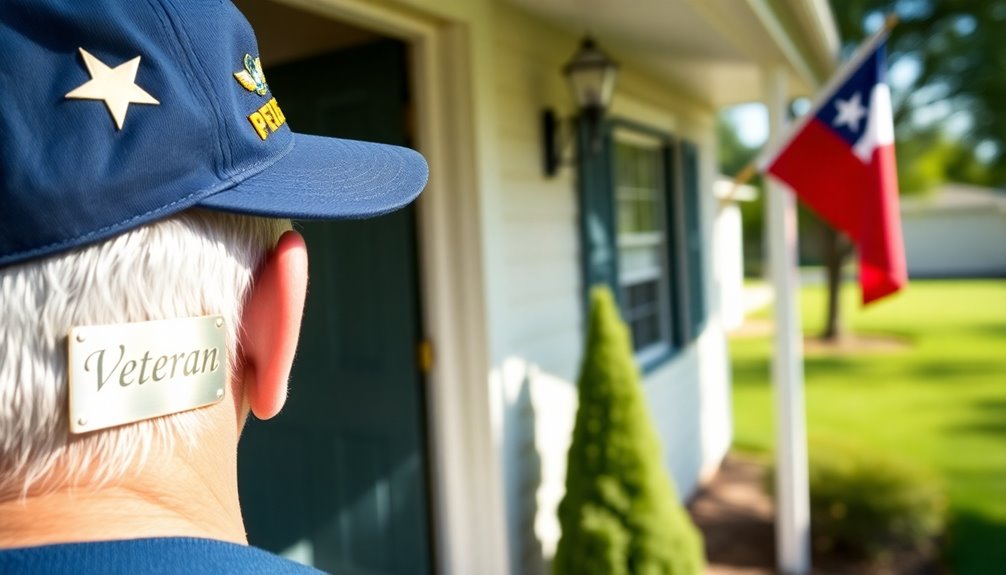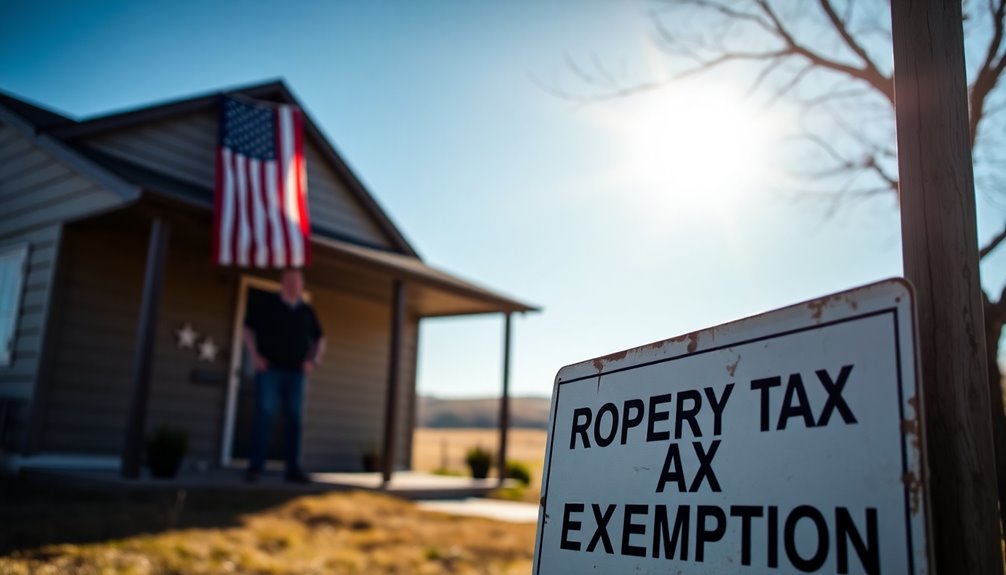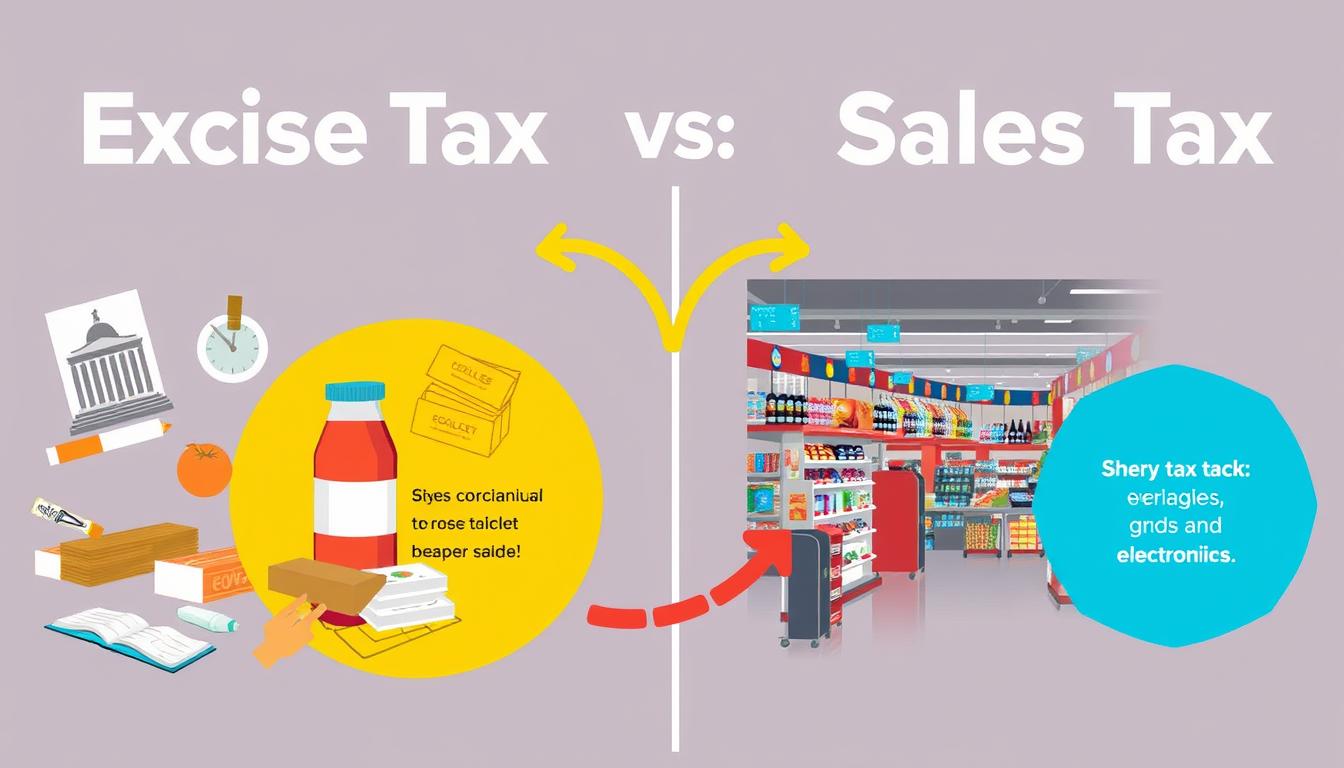In Texas, you might not pay property taxes if you're a veteran with a service-connected disability. Depending on your disability rating, you could receive an exemption ranging from $5,000 to a full exemption if rated 100%. You'll need to ensure you're honorably discharged and gather the necessary documents for your application. Additionally, surviving spouses and unmarried children of disabled veterans may also qualify for exemptions. It's crucial to be aware of the application deadlines and eligibility criteria. If you're curious about the specifics of the exemption application process, there's more useful information available.
Key Takeaways
- Veterans with a service-connected disability may qualify for property tax exemptions in Texas.
- Exemption amounts vary based on disability ratings, ranging from $5,000 to a full exemption.
- Eligible beneficiaries include disabled veterans, unremarried surviving spouses, and unmarried children under 18.
- To apply, veterans must gather necessary documentation and submit an application by April 30.
- 100% disabled veterans may be exempt from all property taxes, significantly reducing their financial burden.
Eligibility for Property Tax Exemptions

Veterans in Texas often qualify for property tax exemptions, but there are specific eligibility criteria you need to meet. To qualify, you must be a veteran of the U.S. armed forces with a service-connected disability, classified as disabled by the Veteran's Administration or the branch of service you served in. Additionally, you need to be a Texas resident and choose a single property to receive the exemption.
The eligible beneficiaries include disabled veterans themselves, the surviving spouse of a disabled veteran (as long as they don't remarry), and the surviving spouse of a service member killed in the line of duty. Unmarried children under 18 of a disabled veteran or a service member killed in action can also qualify. An unremarried surviving spouse can continue the exemption on a new homestead if they choose. Awareness of state-specific exemptions can lead to significant savings for eligible applicants.
To apply, you must provide documentation such as an official award letter from the Department of Veterans Affairs, proof of Texas residency, and proof of property ownership.
You'll need to submit your application through your County Appraisal District or local tax office, and remember, you may need to renew your exemption annually.
Disability Rating and Exemption Amounts

When it comes to property tax exemptions in Texas, the amount you can receive is directly tied to your disability rating from the VA. If your rating falls between 10% and 29%, you'll qualify for an exemption of up to $5,000. This exemption reduces the taxable value of your primary residence.
For those with a disability rating of 30% to 49%, the exemption increases to up to $7,500. Similarly, if your rating is between 50% and 69%, you can benefit from an exemption of up to $10,000.
The most significant exemption applies to veterans rated between 70% and 100%. Here, you can receive up to $12,000, and if you're rated at 100% disability, you could even qualify for a full property tax exemption. This full exemption is available for veterans with a 100% service-connected disability rating, providing substantial financial relief.
These exemptions are mandatory for eligible veterans, meaning you won't have to apply for them; they automatically apply to your primary residence based on your disability rating.
Understanding your disability rating is crucial since it directly impacts how much you can save on property taxes in Texas.
Application Process for Veterans

Navigating the application process for property tax exemptions in Texas can seem daunting, but it's straightforward once you know the steps.
First, ensure you meet the eligibility criteria: you must be an honorably discharged veteran with a service-connected disability rating. Your property should also be your primary residence. Surviving spouses can apply too, provided they haven't remarried and live in the home.
To get started, gather the required documentation. You'll need your military discharge papers (DD Form 214), proof of disability from the VA, and a current award letter from the US Department of Veterans Affairs.
Don't forget your Texas driver's license or ID card showing your current address. Additionally, it's beneficial to consult the knowledge base for further guidance on the exemption process.
Next, you'll fill out the appropriate application form—Form 50-114 for the 100 Percent Disabled Veteran exemption or Form 50-135 for the Disabled Veteran's or Survivor's Exemption.
You can submit your application online, by email, mail, or in person at your county appraisal district office. Remember to submit by the April 30 deadline, though late applications can be filed up to a year after the delinquency date.
Once approved, you won't need to reapply annually unless your eligibility changes.
Additional Exemptions Available

In addition to the primary exemptions for disabled veterans, several other benefits are available that can further ease the financial burden of property taxes.
If you have a 100% disability rating, you're exempt from all property taxes. For ratings between 70-99%, you'll receive a $12,000 exemption, while those with a 50-69% rating can benefit from a $10,000 exemption.
Those with a 30-49% rating qualify for a $7,500 exemption, and a $5,000 exemption is available for ratings between 10-29%.
Surviving spouses who haven't remarried and live in the home can also receive exemptions, as can children under 18 and unmarried children of deceased veterans. Additionally, documentation of service-connected disability is required for the exemption application process.
Furthermore, if you're a surviving spouse of a service member killed in action, you're eligible for a 100% property tax exemption, provided you haven't remarried.
Keep in mind that age-based exemptions may apply if you're a disabled veteran aged 65 or older.
Exemptions apply to a single property owned as of January 1, and the local tax assessor's office can provide specific details on eligibility and documentation needed.
Raising Awareness and Implementation

Raising awareness about property tax exemptions for veterans is crucial to ensuring that those who served our country receive the benefits they're entitled to. To achieve this, the Texas Veterans Commission and county Tax Appraisal Offices are working together to inform all 254 counties in Texas. They utilize direct contact with county officials and public announcements to spread the word effectively.
You might find that educational efforts include distributing official award letters from the Department of Veterans Affairs and providing a step-by-step application process. Community outreach with local veteran organizations helps to increase awareness, while workshops and seminars can further explain these exemptions. As part of this initiative, new legislation like HB 3613 has been enacted to enhance benefits for veterans.
Collaboration between various entities, including local appraisal districts and veteran support groups, is key. They assist in disseminating information and processing applications. You can also find detailed information on government websites.
Don't forget about compliance and deadlines! The typical application deadline is April 30, with possible extensions. Ensure you have the necessary documentation, like VA award letters, and notify appraisal districts of any eligibility changes. Staying informed will help you navigate the benefits available to you as a veteran in Texas.
Frequently Asked Questions
Can Disabled Veterans Receive Tax Exemptions on Rental Properties?
No, disabled veterans can't receive tax exemptions on rental properties.
The exemption only applies to your primary residence, which means you must own and live in the property.
If you're renting out a property, it won't qualify under the disabled veteran exemption rules.
Make sure to designate your homestead properly and check for other potential tax relief options that might be available, but remember, rental properties aren't covered under this specific exemption.
What Happens if I Move Out of Texas?
If you move out of Texas, you won't qualify for the property tax exemptions you'd while living there.
These exemptions are specific to Texas residents and only apply to properties within the state.
Unfortunately, there's no way to transfer these benefits to another state.
Are Property Tax Exemptions Applicable to Commercial Properties?
Yes, property tax exemptions can apply to commercial properties.
If you're using renewable energy, like solar or wind-powered devices, you might qualify for a 100% exemption on the equipment.
Additionally, if your commercial property is valued under $5 million, you can benefit from a 20% cap on annual appraisal increases for three years.
These exemptions help reduce your property tax liability, making it easier to manage your business expenses.
How Often Do I Need to Reapply for Exemptions?
You need to reapply for your property tax exemptions every five years under the new Senate Bill (SB) 1801.
The first review cycle began in January 2024, so keep an eye out for notices from your Appraisal District.
If you don't respond promptly, you risk losing your exemption.
Make sure to check the specific deadlines for your district, as they can vary, to ensure you maintain your benefits.
Can I Receive Both State and Federal Tax Benefits?
Yes, you can receive both state and federal tax benefits as a veteran.
If you're eligible for property tax exemptions in Texas, you can still take advantage of federal programs like the Work Opportunity Tax Credit (WOTC).
Just ensure you meet the specific requirements for each benefit and have the necessary documentation ready, like your disability rating letter.
Combining these benefits can significantly ease your financial burden.
Conclusion
In Texas, veterans can benefit from various property tax exemptions that ease their financial burden. If you qualify based on your disability rating, you could reduce your property taxes significantly. Remember to complete the application process to secure these benefits. Additionally, explore other exemptions that may apply to you. Staying informed and advocating for your rights ensures you make the most of what's available. Don't hesitate to seek help if you have questions about the process!









